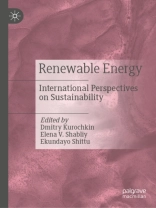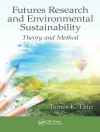This book bringing together leading researchers in the field of renewable energy to discuss sustainability on a broad scale and to examine the status quo of renewable energy industry development in a global context. The volume starts with the European Union, then reviews current trends in the United States as well as the Middle East, Central Asia, and Latin America. It moves on to analyze the German transition to one hundred percent renewable energy economy and energy systems (
Energiewende) with a climate protection plan and sustainable economic development; and continues on to examine the determinants of the adoption of sustainable solutions in Finland and discuss the renewable energy agenda in the European Union with the 17 Sustainable Development Goals at its core.
Climate change has become one of the main global drivers for policy and this book discusses both it’s over all global development as well as spotlighting localized progress across multiple continents. Over one hundred and fifty countries have developing sustainable energy policies, tax incentives, and laws. China remains the leader in renewable energy generation; and countries including the United States, the UK, India, Spain, and Turkey, compete in the Renewable Energy Sector to attract investments. In 2018, global investments in renewables exceeded $200 billion. The state of Bahia in Brazil has been experiencing a surge in wind energy production; and public policy has had a positive effect on that expansion. Kazakhstan is a country with great renewable energy prospects, particularly in wind, hydropower plants, and solar energy. This book is a comprehensive overview and invaluable reference for all those in the renewable energy sector.
Jadual kandungan
Introduction: Renewable Energy: An Independent Sustainable Future; Dmitry Kurochkin and Elena V. Shabliy.- Part One: Renewable Energy in Europe.- Chapter 1: Economic and Political Foundations of Effective Transition to Renewable Energy: Ordoliberalism, Polanyi, and Cities as Hubs for Climate Leadership and Innovation; Mishka Lysack.- Chapter 2: Interplay between Economics and Environment: Determinants of Sustainable Solutions; Tero Rantala, Minna Saunila, Juhani Ukko, and Jouni Havukainen.- Chapter 3: Renewable Energy Strategies in the European Union for Sustainable Development; Erginbay Uğurlu.- Part Two: Renewable Energy in North and South America.- Chapter 4: Energy Transition and Social Movements: The Rise of a Community Choice Movement in California; Ida Dokk Smith.- Chapter 5: Wind Energy and Policy in Brazil: An Assessment of the State of Bahia; Lucigleide Nery Nascimento.- Part Three: Renewable Energy in the Middle East and Central Asia.- Chapter 6: Regulatory Framework for Development of Renewable Energy Generation in Turkey; Özlem Döğerlioglu Isiksungur.- Chapter 7: Turkey’s Renewable Energy Prospects Towards The 100th Anniversary of The Republic; Çiğdem Pekar.- Chapter 8: Renewable Energy in Kazakhstan: Potential and Challenges; Vakur Sumer, Cengizhan Canaltay, and Lidiya Parkhomchik.- Conclusion.
Mengenai Pengarang
Dmitry Kurochkin is a senior research analyst at Harvard University, USA.
Elena V. Shabliy is a visiting scholar at Columbia University, USA and a postdoctoral fellow at Harvard University, USA.
Ekundayo Shittu is Assistant Professor of Engineering Management and Systems Engineering at George Washington University, and a Research Affiliate at George Washington University Solar Institute, USA.












